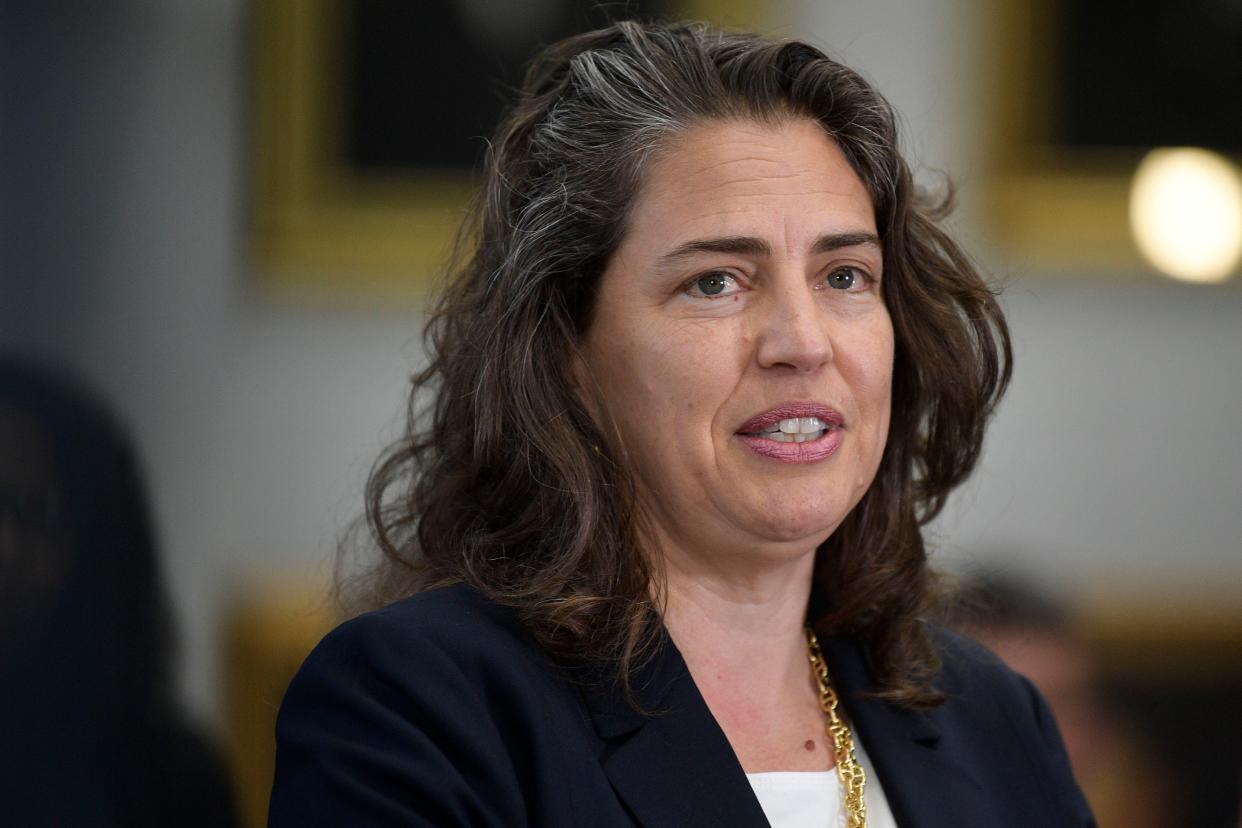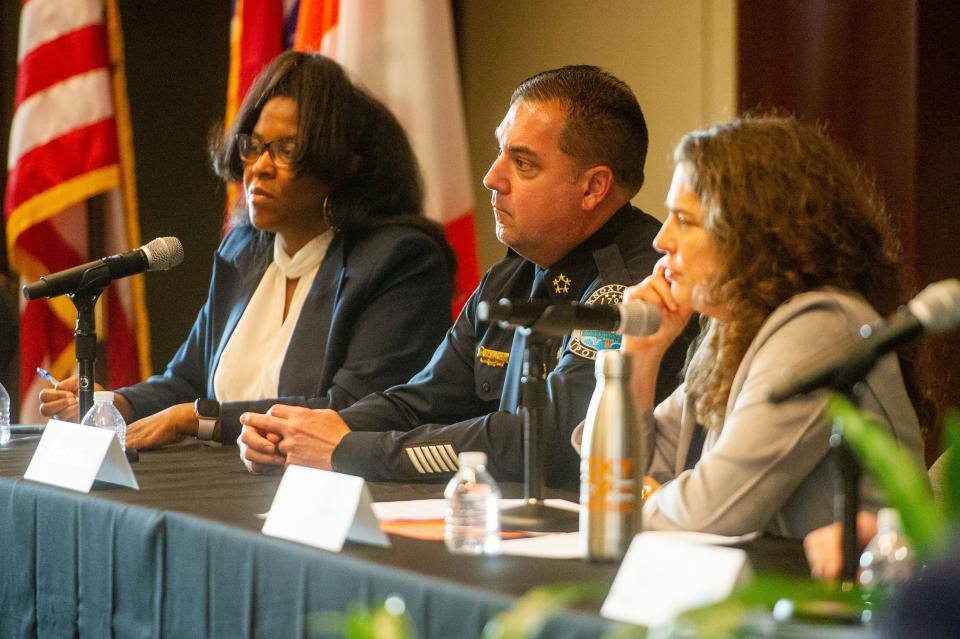Knoxville admits it hired a police chief search firm to go around public records laws

When Knoxville City Council members signed off on a $43,000 bill to pay a firm to find the next police chief, they were purchasing a full-service package.
The Police Executive Research Forum, which specializes in police chief searches, promised the works: a needs assessment, community engagement, advertising and recruiting for the position, candidate screening, and ultimately, a list of the best candidates for the job.
The contract also allowed the city to do something it desperately wanted to do: Keep taxpayers from finding out the candidates' names. By paying a firm to handle the hiring, Mayor Indya Kincannon and her team thought they could bypass Tennessee's open records laws and keep taxpayers in the dark.
How do we know? An attorney the city hired to fight an open records lawsuit by Knox News admitted it in court.
City leaders repeatedly used the contract as a shield, denying multiple Knox News open records requests for details about the search and the candidates.
Kincannon and a committee sworn to secrecy even resorted to an elaborate scheme to avoid creating documents. They had the Police Executive Research Forum, commonly called PERF, show hiring documents like resumes in a video conference so city employees could plausibly say they had no documents subject to open records review.
More:Data blows up Knoxville's claim that secret police chief searches protect candidates
More:These are the questions Knoxvillians didn't get to ask our police chief candidates
Many other cities, in contrast, embrace accountability and transparency by conducting a wide open process to hire a police chief, including Chattanooga, which conducted a highly public process. Chattanooga's candidates included New Orleans Police Deputy Superintendent Paul Noel, who ultimately was hired by Knoxville and assumed the police department's top spot on June 13.
Judge drills down into open records end-around
This summer, Knox News sued the city on behalf of taxpayers to see records from the search.
Knox County Chancellor John Weaver unwound the city's strategy Oct. 7 in a relentless line of questioning that painted the city's hired attorney, Chris McCarty, into a corner. Weaver repeatedly asked McCarty if the city hired PERF to avoid public disclosure required by the law.
McCarty danced around the question several times, but Weaver eventually got his answer.
Weaver, asking about how the search process was designed: "I asked you if these things were done so there would be no records of some of these activities. Was it conducted in this way so there would be no records of certain activities? Yes or no? And if the answer is no, just say no, it wasn’t done that way for that purpose.
McCarty: “Your honor, obviously when I say – (McCarty pauses) – the answer is yes because we were trying to eliminate the possibility that those candidates would fear that their names would be disclosed to the public, therefore, questioning and threatening their current jobs, therefore not having them apply in the first place. I have to keep bringing that up - that’s the actual motivation here.
"So, when the question is posed to me that the point is to illicitly get around the statute, it wasn’t. The point was to get the best people for the job. That’s the point. And the statute, in some ways, the way in which Mr. Hollow reads is, which we don’t read it, would chill that.” (Editor's note: Mr. Hollow is Knox News attorney Richard Hollow.)
Weaver: “Does the statute say if there’s a chilling effect you can enter into arrangements with private entities and you can conduct your activities such that there will be no public record?"
McCarty: “No, but that’s basically what the Memphis Publishing case says, your honor, which we followed."
Though the Memphis court case McCarty referenced has some similarities to Knox News’ lawsuit over records - it also dealt with records from a police chief search - it is not binding and Weaver is free to reach a judgment based on his understanding of the law.
Kincannon and her team: We don’t have any records
Throughout the hearing, McCarty maintained the city has no records of the candidates or finalists. The agreement Knoxville struck with PERF, however, explicitly allows Kincannon to request the records for up to three years.
Regardless of what the agreement says, the very foundation of the question is “absurd” and cities trying to hide public search documents is a "con," said David Cuillier a University of Arizona journalism professor who studies public and press access to government information.

Cuillier, without knowing it, echoed Weaver’s line of questioning about whether the city could keep using private firms for all sorts of tasks to get around the open records law.
“The government could do that with everything and it would just say, ‘Oh, yeah, we contracted with a mayor service agency. It's private. They do all the mayor’s communications, budgeting and everything for the city. We don’t have any public records regarding the budget or emails (or) how the city's run because we've contracted out with a private company to do that.’ That would be ludicrous,” Cuillier told Knox News.
Deborah Fisher, executive director of the Tennessee Coalition of Open Government, said she sees little difference between creating an elaborate process for avoiding public records law and shredding documents. In either case, officials are shutting out residents from public decisions.
“The very purpose of the public records law is to ensure that government operates transparently for its citizens," she told Knox News in an email. "It’s disappointing when government gets wildly creative just to avoid this basic duty to citizens.”
How the city handled its closed-door police chief search
As the search firm sought out candidates and narrowed the field, city leaders deliberately avoided creating public records to hide from residents the details of the process and the people under consideration.
The city hired a private organization to conduct a candidate search instead of relying on its own human resources department.
That organization, the Police Executive Research Forum, handled the hiring process at a cost to taxpayers of $43,000.
Kincannon appointed a committee to review candidates, but required members who weren't city employees to sign nondisclosure agreements so they couldn't discuss the hiring process.
The Police Executive Research Forum collected applications and shared them with the city, but only by methods that did not create documents, which would be public under the state's open records laws.
The Police Executive Research Forum, commonly called PERF, set up interviews by Zoom, the online teleconference system. It showed candidates' resumes and other documents within the Zoom so the city did not have to create written documents subject to public scrutiny.
What the city denied
Specifically, the city refused Knox News' following open records requests, including meetings of a Police Chief Advisory Committee made up mainly of public employees and convened by the mayor:
Provide a list of the names of the people who applied for the Knoxville police chief position
Provide the age, ethnicity and gender of each of the applicants for the Knoxville police chief position
Provide the resumes of the applicants for the Knoxville police chief position
Provide a schedule of all Police Chief Advisory Committee meetings
Provide any/all Police Chief Advisory Committee meeting agendas, minutes and other documents created by/for the committee
Provide permission to sit in on upcoming Police Chief Advisory Committee meetings
Separately the city denied a request for "each and every record, document, electronic file or other material, regardless of physical form or characteristic, made or received."
Tyler Whetstone is an investigative reporter focused on accountability journalism. Connect with Tyler by emailing him at tyler.whetstone@knoxnews.com. Follow him on Twitter @tyler_whetstone. Make our community, our society and our republic stronger by supporting robust local journalism. Subscribe online at knoxnews.com/subscribe.
Knox News reporter Areena Arora contributed to this report.
This article originally appeared on Knoxville News Sentinel: Knoxville admits it hired search firm to avoid public record laws

